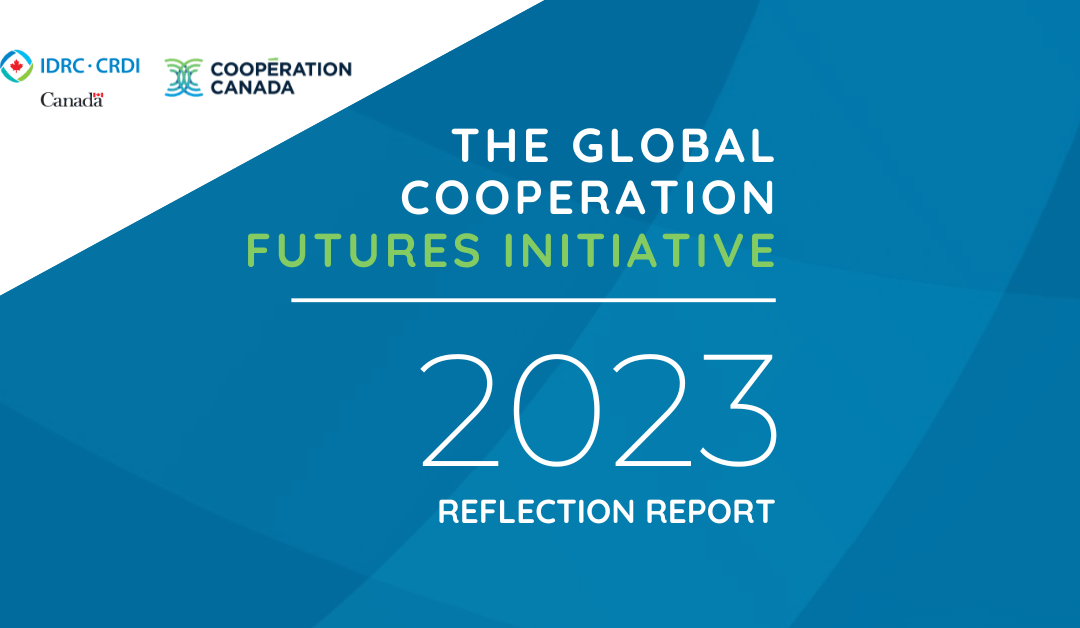
by Cooperation Canada | Feb 28, 2024 | Futures, News, Publications
One year has passed since Cooperation Canada embarked on its first ever strategic foresight project, the Futures Initiative. Since then, significant strides have been made, and in this report, we reflect on our journey, showcasing our advancements to date, insights gleaned from employing strategic foresight, and the methodologies instrumental in studying the global landscape, and identifying emerging trends, signals, and drivers of change within the international cooperation sector. The report underscores the indispensable role of foresight in navigating the complexities of the international development sector. It is our aspiration that this reflection report not only offers valuable insights but also serves as a guiding resource for organizations embarking on their own foresight endeavours.
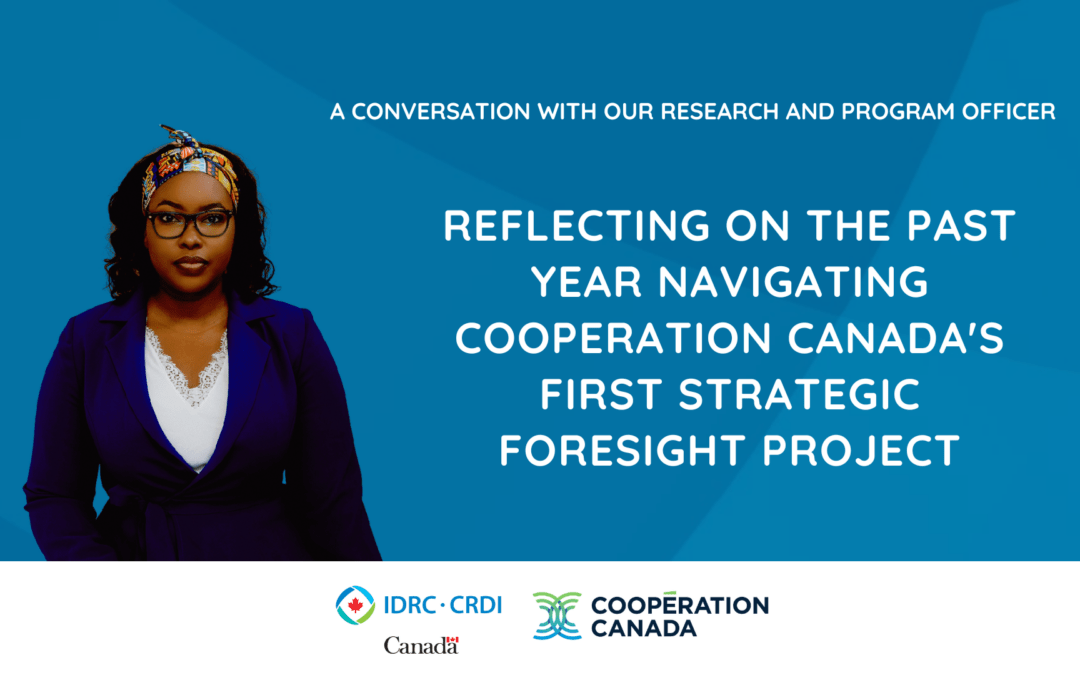
by Gabriel Karasz-Perriau | Feb 28, 2024 | Futures, News
A Conversation with Cooperation Canada’s Research and Program Officer, Andy Ouedraogo.
Andy Ouedraogo is the Research and Program Officer for Cooperation Canada’s first strategic foresight project, the Global Cooperation Futures Initiative, funded by the International Development Research Centre (IDRC). One year after the launch of the project, Andy recounts how far she’s come and presents a new report, the Landscape Analysis of the International Cooperation Sector.
You joined Cooperation Canada as Research and Program Officer to lead our first ever project on strategic foresight funded by the International Development Research Centre (IDRC). Now, a year in, where are we at?
It has been quite the journey and I’m happy to say that one year in, we have achieved quite a few milestones including the recent conclusion of our research-intensive phase commemorated with the launch of a Landscape Analysis of the International Cooperation Sector; a scan of emerging trends and drivers of change. We’ve also engaged close to 220 Canadian and global international development actors in our workshops, focus group discussions, and surveys, with a view to co-create knowledge and include as many voices and perspectives as possible.
Can you tell us how you managed to navigate the complex landscape of foresight?
Anticipating the future can be daunting. Leading this project feels like building a car while driving it. We are not only steering and navigating the vehicle but also installing components, fine-tuning the engine, and adjusting the design—all while on the move. During the first few months, the fear of not getting it right loomed like a shadow over my eager enthusiasm. Anticipating the future? Who, me? But I’ve learned to shift my focus away from achieving pinpoint accuracy and towards embracing the iterative process of refining strategy, incorporating new insights as they surface, re-assessing methodologies and course correcting where needed.
Futures don’t follow a script, and plans will inevitably change. Rigid timelines and linear approaches are not the most responsive to change and would limit one’s ability to identify new trends and emerging issues that could potentially be disruptive. Being adaptable and working with a strategic foresight partner who embraces flexible and agile methodologies has been key to navigate uncertainties and keep our project on course.
I will also add that good foresight hinges on the diversity of the data set, including input from a wide range of stakeholders. By engaging diverse voices and perspectives, we gain a more comprehensive understanding of potential future trajectories. An example of how Cooperation Canada did this is through our regional dialogues, organized in partnership with regional networks of CSOs in five different regions. These dialogues were instrumental in validating existing domains based on regional nuances, challenges, and future aspirations for the sector. Moreover, they enabled us to incorporate intra-personal observational knowledge, derived from participants’ firsthand observations of local change and their perceptions of the future of development influenced by local and regional events and trends.
Any lessons you could share or pieces of advice for CSOs seeking to venture into foresight?
The realization that the future doesn’t have to be a single fated outcome has been profound. Recognizing this plurality has broadened my perspective and highlighted the complexity of plausible future scenarios and so my first piece of advice would be to embrace the plurality of the future.
Then, I would say scope wisely to ensure relevance, actionability, and impact. Future studies could easily take you in so many directions, especially when looking into global systems. You quickly realize how interconnected the world is and may end up trapped in a giant spider web not knowing in which direction to go. By defining clear boundaries and objectives, not only have we been able to tailor the foresight process to suit our specific needs and context, but we were also able to choose appropriate methodologies, approaches, and tools that are best suited to the Futures Initiative.
My final piece of advice would be to opt for an iterative approach and emphasize process over precision. It is so crucial to allow space for continuous learning, experimentation, and improvement to ensure the relevance of the outcome.
The fun of strategic foresight isn’t just in the outcome; it’s in the process. It’s in the laughter during brainstorming sessions, the “aha” moments when a trend clicks, and the shared excitement when a foresight exercise sparks creativity. So, embrace the process.
What does the future look like for you?
Well, the future is much closer than you would imagine. With just two workshops remaining, I look forward to co-creating three transformative scenarios for international cooperation with CSOs and other development actors, as well as studying and discussing their implications for the next 7-10 years.
Click here to register for our scenario creation workshop!
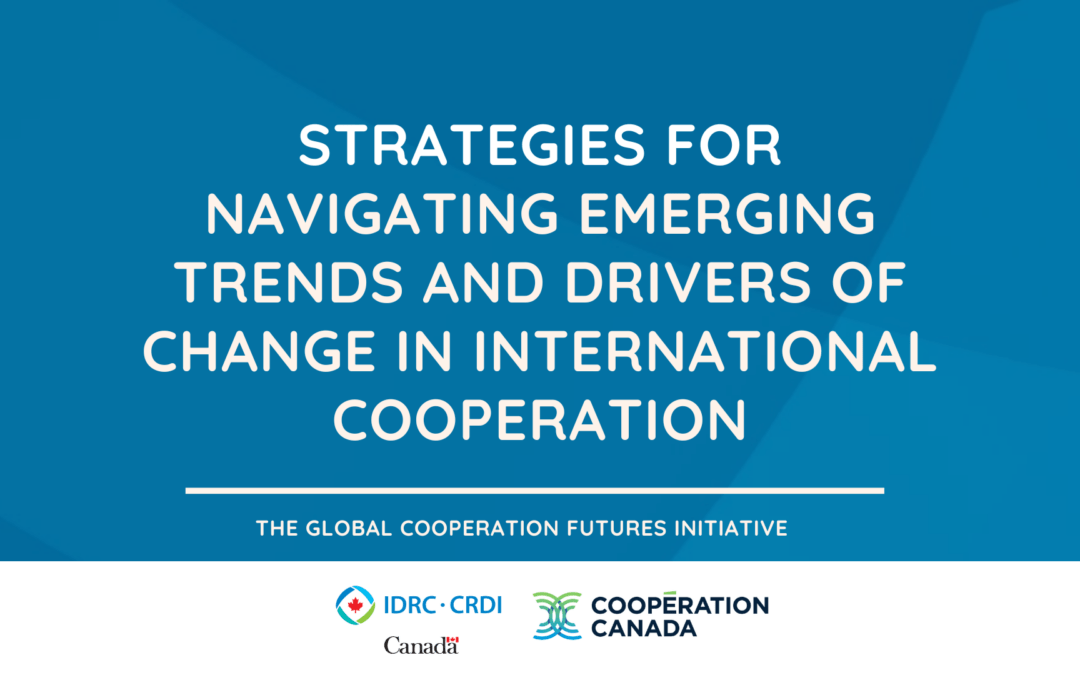
by Gabriel Karasz-Perriau | Feb 28, 2024 | Futures, News
The outlook for international cooperation actors for the coming decade is both uncertain and turbulent. That is the conviction behind our newly launched Landscape Analysis of the International Cooperation Sector, a scan of emerging trends and drivers of change, and an output of Cooperation Canada’s Futures Initiative. The Report links emerging trends and challenges with direct implications for international cooperation actors.
Rather than feeling overwhelmed by those implications, Civil Society organizations (CSOs) can equip themselves to effectively navigate this increasingly volatile environment and adopt innovative strategies that not only address emerging trends but also empower them to prepare for a range of plausible futures. Let’s explore four key strategies a Civil Society organization (CSO) can use to navigate uncertainty.
Strategic Foresight
Strategic foresight is a systematic approach to exploring alternative futures, anticipating potential challenges, and identifying strategic opportunities for action. Unlike traditional planning methods, which often rely on past trends and linear projections, strategic foresight embraces uncertainty and complexity, empowering organizations to navigate ambiguity and make informed decisions in the face of uncertainty. In another blog, I dive deeper into the importance of strategic foresight for CSOs, click here to read more.
Integrative Thinking
Integrative thinking is the ability to bridge siloes, forge links, and overcome the imperative of making unpleasant choices by mapping out and leveraging the interdependencies within and between systems for long term impact and resilience. Integrative thinkers refrain from binary choices and instead embrace the complexity of issues by synthesizing intuition, reason, and imagination. By building comprehensive models that consider various variables and causal relationships, CSOs can develop holistic approaches that engage diverse stakeholders and systems. Integrative thinking allows organizations to creatively resolve tensions and uncover opportunities that may have been overlooked. Embracing this mindset can enable CSOs to tackle multifaceted challenges with agility and effectiveness.
Impact Communication
With shrinking funding pools, CSOs must increasingly demonstrate their impact and effectively communicate their results. Merely showcasing the worthiness of a mission is no longer sufficient; donors increasingly demand evidence of tangible outcomes and social returns on their investments. CSOs need to invest in impact communication, where resonant storytelling plays a pivotal role. By sharing compelling narratives that illustrate how their work confronts inequity and drives positive change, CSOs can cut through the noise and inspire meaningful engagement from donors and stakeholders. Transparency, authenticity, and empathy are key elements of impactful storytelling that resonate with audiences and foster trust in the organization’s mission.
Diversification of Revenue Streams
In today’s ever-changing economic landscape, it’s imperative for Civil Society Organizations (CSOs) to take proactive steps in diversifying their revenue sources to bolster financial resilience. Our comprehensive landscape report underscores a growing trend among organizations, as they turn to digital currencies and explore private financing options to mitigate financial risks and drive innovation and adaptability. This strategic move towards revenue diversification gains heightened significance in the face of challenges such as the sovereign debt crisis, diminishing contributions from Official Development Assistance, and the shrinking civic space.
In conclusion, navigating the evolving landscape of international development cooperation requires CSOs to embrace innovation, resilience, and accountability. By adopting integrative thinking and foresight, diversifying revenue streams, and prioritizing impact communication, CSOs can proactively address emerging trends and drive sustainable progress in their communities. As agents of change, CSOs have the opportunity to lead by example and shape a more equitable and inclusive future for all.
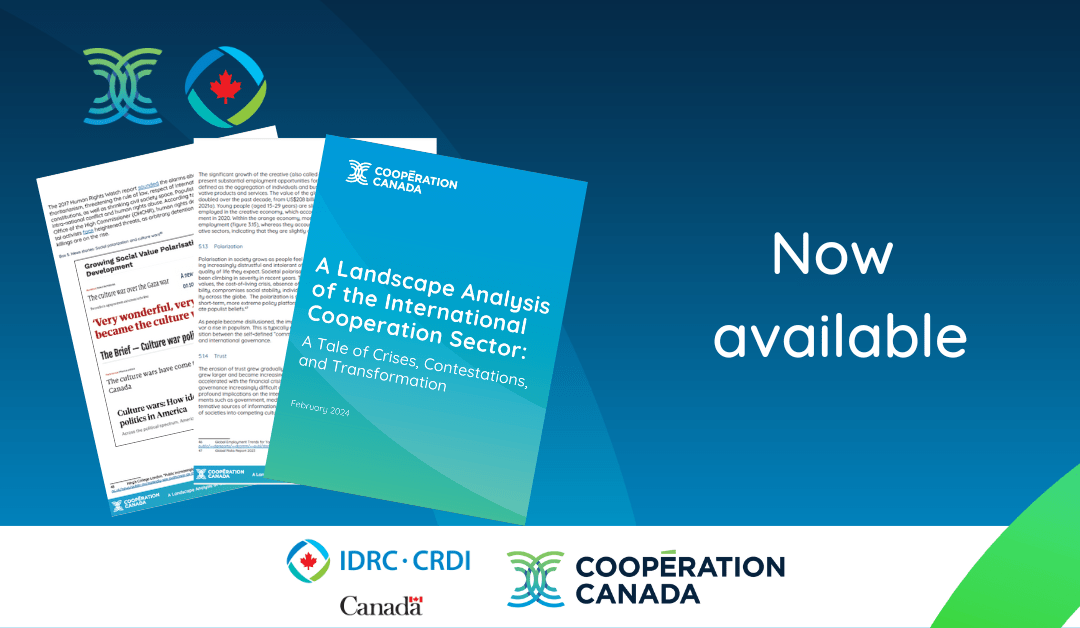
by Cooperation Canada | Feb 28, 2024 | Futures, News, Publications
Cooperation Canada is proud to announce the launch of our Global Landscape Analysis of the International Cooperation sector, a report of the Global Cooperation Futures Initiative funded by the International Development Research Centre (IDRC).
Drawing from a year of extensive research and insights from experts, our report provides a panoramic view of the challenges, trends, and emerging issues impacting international cooperation. As we stand on the cusp of unprecedented change, this analysis offers invaluable insights into the pressing issues facing the international community. From geopolitical shifts to economic warfare, climate change, and the digital divide, this report highlights the interconnectedness across and between issue areas and their implications for international cooperation actors.
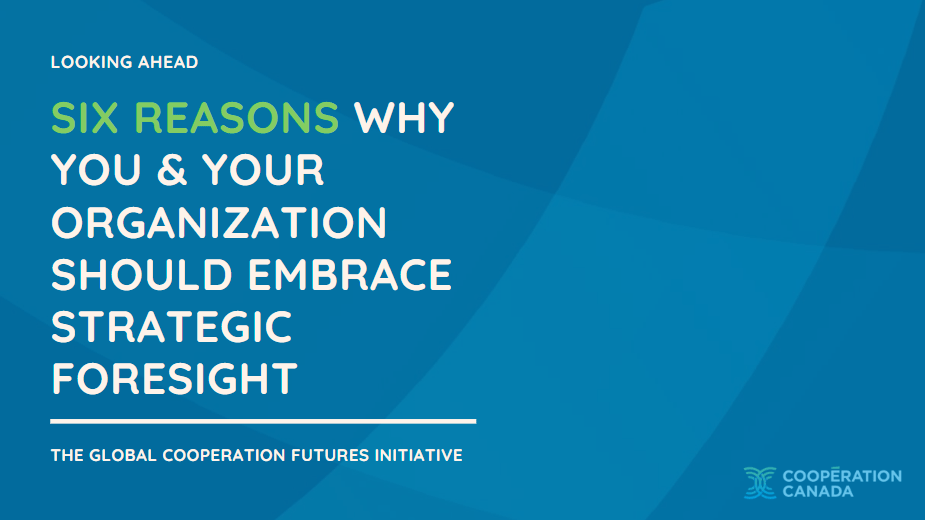
by Cooperation Canada | Feb 15, 2024 | Futures, News
It’s common knowledge that the pace of change in our world is accelerating rapidly, right? Each day brings fresh challenges, and now more than ever, our environmental, political, social, economic, and technological realms are deeply interconnected. A crisis originating in one corner of the globe can swiftly affect another, weaving an intricate network of interrelated issues that demand our immediate attention. In such a dynamic environment, organizations cannot afford to merely react, particularly Civil Society Organizations (CSOs), which increasingly find themselves leading the charge for change.
To stay effective and pertinent, CSOs must adopt a proactive stance that enables them not only to identify emerging trends but also to foresee their repercussions and adapt promptly.
Strategic foresight might be the answer. It provides a systematic approach to exploring potential future developments and their impact on present-day decision-making. In this blog, we explore why CSOs should embrace strategic foresight as a crucial tool for strategic planning and decision-making, outlining six key benefits of doing so.
Identifying emerging trends and drivers of change
Strategic foresight involves diligently scanning the horizon for emerging issues and trends. As CSOs become adept at identifying, tracking, and analyzing these nascent patterns and shifts across diverse sectors, they enhance their ability to adapt their strategies and stay ahead of their game.
Developing customized advocacy
Once CSOs anticipate the potential repercussions of emerging trends within their specific areas of focus, they can adjust their advocacy strategies accordingly. They are also better positioned to engage in policy advocacy grounded in evidence leading to the creation of more sustainable and all-encompassing policies.
Formulating flexible responses and interventions
The ability to formulate flexible responses to swiftly altering circumstances is a hallmark of proactive CSOs. By pre-emptively envisioning plausible scenarios and hurdles, these organizations can ensure that resources are mobilized proactively and allocated efficiently to tackle emerging challenges.
Engaging in innovation and experimentation
CSOs should not shy away from embracing novelty and experimentation. Strategic foresight equips CSOs to construct alternative scenarios about what future changes could occur and design forward-looking strategies for advancing or reframing their objectives under a wide range of possible circumstances. Envisioning the future and exploring innovative solutions allows them to test uncharted waters, adjust to changing situations, and instigate transformative change within their domains.
Building Credibility and Trust
By becoming proactive trailblazers who can foresee challenges and devise innovative solutions, CSOs enhance their credibility and reputation among stakeholders, benefactors, and beneficiaries. This trust increases the credibility and reputation of these organizations.
Ensuring Long-Term Viability
Strategic foresight helps to prevent poor decisions based on unquestioned assumptions about the future. Practicing foresight enables one to spot new challenges sooner, so as not to be caught by surprise, and to perceive a broader universe of positive opportunities. CSOs are better equipped to bolster their organizational endurance and long-term viability by constantly assessing the relevance and efficacy of their strategies and initiatives.
In conclusion, embracing strategic foresight enables CSOs to proactively shape the future they envision, positioning them as leaders in driving social change, promoting human rights, and addressing the complex challenges of our time. While at it, CSOs should remember that today’s problems require collective action and therefore strategic coalitions and partnerships surrounding the use of foresight will be necessary to pool resources, exchange knowledge, and help carve a path towards a more equitable, sustainable, and better world for all.
Stay tuned to learn about Cooperation Canada’s journey into the uncharted waters of strategic foresight through the Global Cooperation Futures Initiative funded by the International Development Research Centre (IRDC).
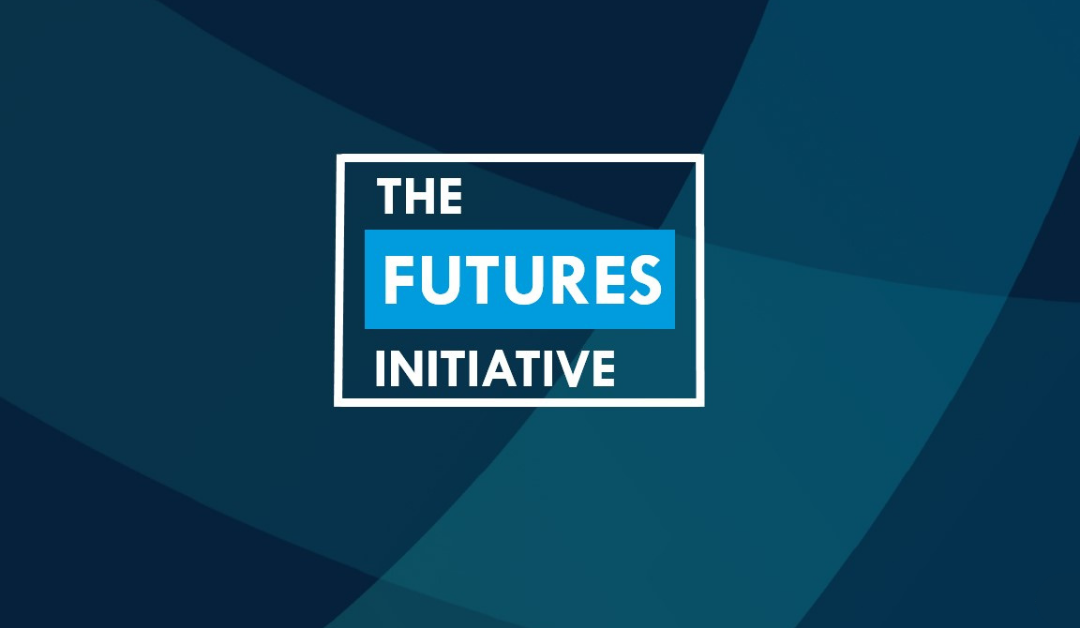
by Cooperation Canada | Jul 21, 2023 | Futures, News
On July 11, 2023, the members of the Core Advisory Group of the Global Cooperation Futures Initiative met to discuss progress made so far, provide feedback as well as recommendations for the next phases of the project.
The Core Advisory Group is a subset of the Strategic Advisory Committee, with 7 members, most of whom with experience in strategic foresight, international cooperation and representing various sectors, including academia, civil society organizations (CSOs), and multilateral organizations. They advise on strategic orientations, including key elements of the project’s process, development, and implementation, including the scope of the environmental scan.
The meeting was opened by Kate Higgins, Cooperation Canada’s Chief Executive Officer, followed by a presentation of the project’s key milestones, challenges to date, and upcoming deliverables by Andy Ouedraogo, Research and Program Officer.
The group discussed concerns and risks associated with a shorter/longer time horizon and the implications for end users’ ability to make the most out of the insights generated by the Futures Initiative. The consensus was that scenarios tend to occur at a faster rate than originally anticipated due to the pace of (i.e., technological) change, hence scenarios developed in 2035 will be useful for planning for 2030, target of this project.
They also provided valuable insights on the initial draft of the environmental scan, the research prioritization workshop and the upcoming regional dialogues aimed to capture perspectives in the global south as well as signals of change, emerging issues and perceptions of the future. It was agreed that although the focus and priority of the regional dialogues would be on Southern regions, it would be a missed opportunity not to engage Northern CSO networks with expertise in foresight.
The meeting ended with a brief overview of the next steps as well as dates for the second advisory committee meeting.







